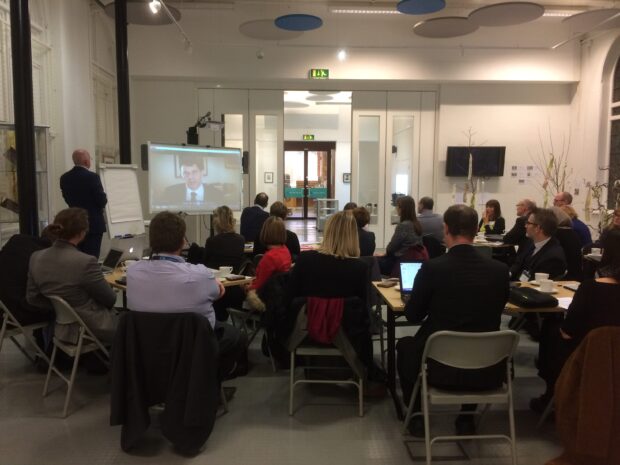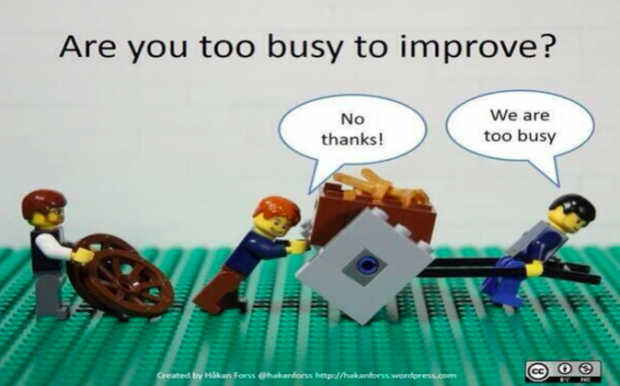As mentioned in the post yesterday, in late November, the Taskforce ran masterclasses (Canada Water library on 27 November; Leeds central library on 29 November) covering 2 substantial pieces of work it had recently published: a toolkit to support evidence-based strategic planning, and a Benchmarking Framework. Yesterday’s post focused on the evidence based planning parts of the sessions (and covered the background to the toolkits and the purpose of the masterclasses), and this post reports on the Benchmarking Framework elements.

Background to the Benchmarking Framework
Ian Leete blogged about the thinking behind the Benchmarking Framework when it was launched in September. Libraries Deliver: Ambition identified the need to support all libraries and library services to develop and maintain a culture of continuous improvement. This became Action 13: Develop and promote a sector-led benchmarking framework that libraries can choose to use to support self-assessment, planning and improvement.
Respondents to the consultation on Ambition told us that it was important that anything like this should be sector-led; focussed on outcomes (rather than just inputs and activities); and one that drove improvement, not box-ticking. They told us it was equally important to keep it light-touch and manageable, given the limited amount of time and resources available to the teams that would be carrying out the assessment.
The resulting Benchmarking Framework is a tool that libraries can choose to use for self-assessment. It is designed to help library services assess the services they currently provide and to be used, together with the evidence-based sustainable planning toolkit, as they plan and develop their library service, in consultation with their communities.
We drew the Benchmarking Framework together to be used by either a complete library service, or by individual libraries. We also wanted it to be useable not only by council-run libraries, but also by community-managed libraries.
Steve Wood, who has experience of working with other similar sectors, such as museums and archives, helped create the Toolkit. In particular, we found that ‘Survive and Thrive’ – a self-assessment tool for museums - was a particularly good fit in terms of a short, simple process for driving improvement; alongside the more in-depth Culture and Sport Improvement Toolkit developed by the LGA.
In the masterclasses, Steve introduced the concepts behind the work he’d done. Using the Benchmarking Framework could provide some very tangible outcomes relating to identifying specific improvement work and opportunities. But in addition, going through the process in itself could be valuable. Involving decision makers, alongside front line staff and peers from other organisations, could help to increase advocacy opportunities, build commitment to shared improvement plans, and stimulate different ways of thinking and working.

Benchmarking in practice: heritage services in Barking and Dagenham
Chris Foord, who leads Heritage services in Barking and Dagenham, talked about his experience of using a very similar benchmarking framework. Experience that he shared in his session included:
- There is no set way to use a benchmarking framework like this - at some points, his service self-assessed across all the characteristics covered in the framework, and at others, it chose a smaller number of things to focus on. Don’t try to do too much and drown in the process!
- You could choose to involve certain partners in considering some issues and not others - for example, you could work closely with local community managed libraries in looking at things like improving community engagement.
- The value of using the framework to think through improvement opportunities is that it helps to set specific actions into a broader context - so it can help develop a more strategic approach to prioritising projects.
- External facilitation can be helpful - from someone working on similar service development in another organisation, for example. Doing this provides challenge, but also useful moderation - to make sure you aren’t scoring yourself too harshly, for example.
- Peer reviews can be useful, as outsiders may challenge you on different things from your own staff. And releasing your staff to act as peer reviewers for others helps to develop their skills and also to identify interesting approaches from elsewhere that you could consider yourselves. London has a strong museums and heritage peer network, which supports a lot of reciprocal engagement and shared learning and challenge.
- Sessions are intensive, but don’t have to be too long. You do need to get the right people along to sessions to get the best out of the time invested. It should be done as a continuous process, not just a one-off exercise, and practice in using the process means that it gets progressively easier to undertake.
Chris posed the final question: Why bother? He answered by saying that, in a volatile environment, organisations had to invest time and thought into how they were going to adapt and respond most effectively, which this process supported. No one can afford to stand still. He argued that the various improvement projects identified through self-assessment (for example, skills development, value for money studies, and work on building better measures of outcomes that his service contributed to) were critical in strengthening the council’s heritage strategy and putting his team into a position where in-house provision was chosen over other alternatives.
Attendees then worked in small groups trying out how they would use the toolkit, with each group looking in depth at one particular characteristic. The energy levels in the room, and attendees’ interest in challenging each other and sharing ideas, were noticeably high!
What do you think?
We’ve launched both the longer term evidence based strategic planning toolkit and the Benchmarking Framework in beta - that’s so we can continue to update them with your feedback. We’d welcome your comments on how you are using the strategic planning toolkit and/or Benchmarking Framework, particularly where you think we could add material or amend the content, or how we could present it differently to make the toolkits more useful to you.
If you’ve got feedback or ideas about either of these tools, please let us know by emailing us on librariestaskforce@culture.gov.uk